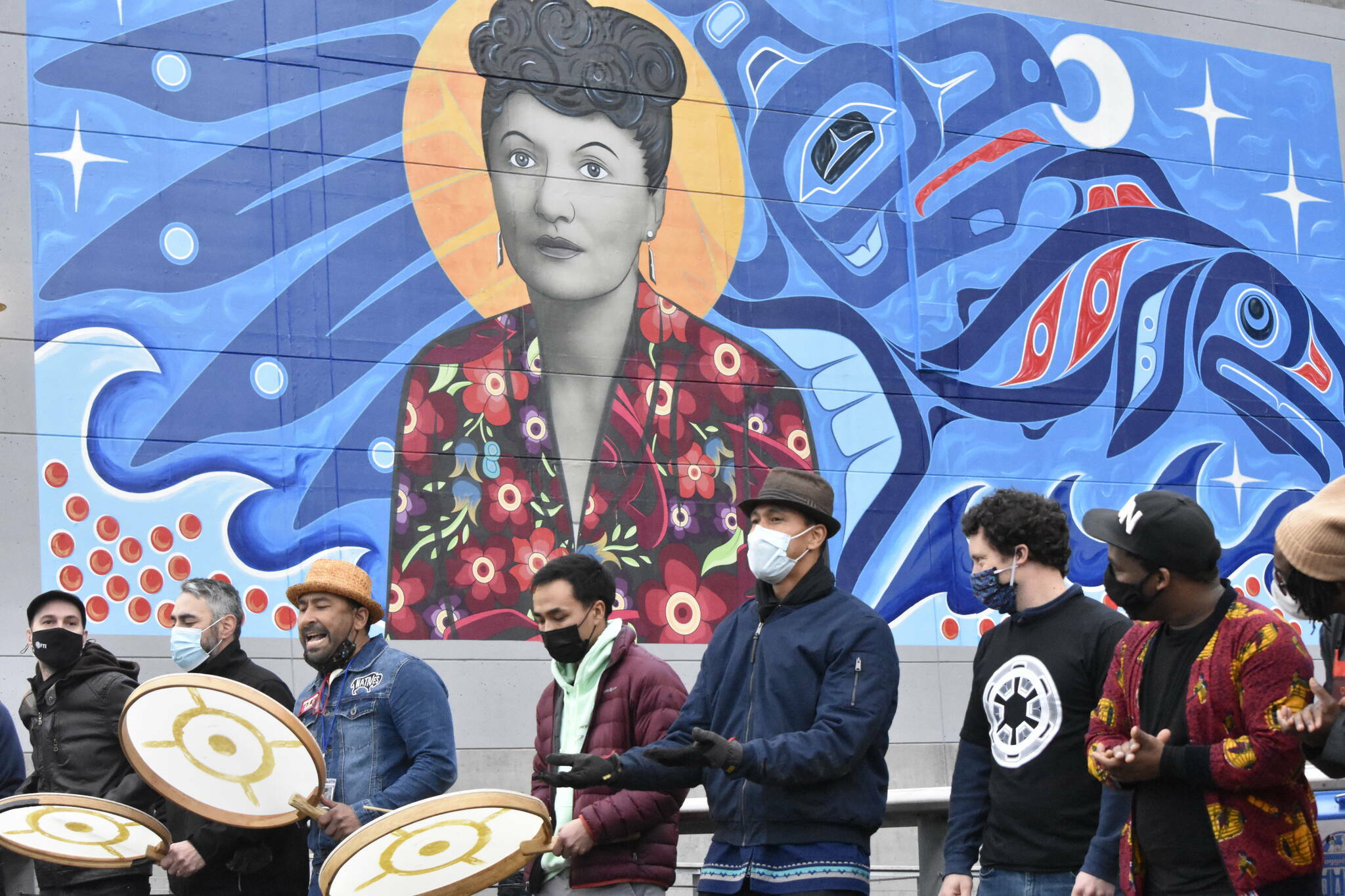Last Tuesday, Qacung Stephen Blanchett, NeilgaKoogéi Revels, Taylor Vivic and five staff members were seated around the conference room table at the Juneau Arts and Humanities Council offices working on last-minute details for the second Áak’w Rock Festival.
But the meeting, which touched on everything from staging elements to travel plans for the musicians coming to town, wasn’t an unusual occurrence.
The group, centered by Blanchett and in various configurations, has been preparing for the Sept. 21-23 festival for at least 18 months. The festival runs every other year, opposite Sealaska Heritage Institute’s biennial Celebration event.
The much-anticipated Áak’w Rock festival this year has expanded mightily from the virtual inaugural festival in November 2021. There were 14 artists that year, 11 of whom came to Juneau to record.
This year’s Áak’w Rock will feature 24 bands comprised of 70 individual performers on three stages: Centennial Hall Convention Center, Elizabeth Peratrovich Hall, and the Juneau Arts and Culture Center building, said Revels, project director for Áak’w Rock.
“It’s an amazing opportunity for Juneau, which will see big-name acts in incredibly intimate settings,” said Revels. “Áak’w Rock is bringing a full music festival experience, including an artists’ market, food trucks, beer gardens and community space to interact with the artists.”
Headliners include Snotty Nose Rez Kids, The Hallucination and Ya Tseen.
The tribes and JAHC are equal partners in the event, said Blanchett, who works as creative director of Áak’w Rock and education director for JAHC. This year’s budget is about $500,000, with about $100,000 of it used to pay the artists.
“Payment is important because so often Indigenous artists are underpaid for the music performances,” said Revels.
The festival is a team effort, Blanchett said.
“The idea was born from a meeting between myself and President Richard Peterson in late 2019,” he said, referring to Central Council of the Tlingit and Haida Indian Tribes of Alaska President Richard Chalyee Éesh Peterson. “We discussed the possibility of the Tlingit and Haida and JAHC partnering on something significant within the arts and culture field, and we landed on creating a festival.”
The community took to the concept immediately, he said, with various people serving on the committee for the first event and volunteering in other ways. The group “included artists, culture-bearers, and community leaders from several sectors of the southeast community,” said Blanchett.
Qacung Blanchett is less forthcoming about the role he has played in the creation of the Áak’w Rock Festival.
“He is a great organizer and great at bringing people together,” said Revels. whose full-time job is special project manager for the chief operating officer of Tlingit and Haida. “Qucong has made the dream happen with the full support of President Peterson.”
The idea for an Indigenous music festival goes back a lot farther than 2019, said Philip Blanchett, his brother.
“This is Qacung’s dream, his work,” he said. The two partnered together in Pamyua, a band first formed in 1995, which is also playing at the festival.
Pamyua blends Inuit drum/dance melodies with R&B vocal styling and arrangements presented through music and dance. It was also a platform to share Indigenous knowledge and history.
By the late 1990s Pamyua was established and touring, but when the brothers were home they worked in cultural education at the Alaska Native Heritage Center in Anchorage, Philip Blanchett said.
“It was a great place to dream of things to have in the community, to uplift our community, to showcase our community, like what we do with Pamyua, but do it in festival format.”
But efforts to get a festival started in Anchorage didn’t get very far.
“Anchorage is a tricky town. Sometimes it’s really difficult to get different parts of the community talking with other parts of the community,” said Phillip Blanchett. “I don’t know what it is, but it didn’t work.”
It was after Qacung moved to Juneau that everything shifted with the idea, Philip Blanchett said. “He really appreciated the community. There was a go-to attitude when it came to cultural inclusion.”
But his brother also had knowledge of both elements needed for Áak’w Rock to come together. “He was in touch with the local Indigenous culture and community, and he was working with the arts and culture community.”
Watching Áak’w Rock come together has been gratifying, Philip Blanchett said. He took “a lot of residual pride” in seeing the virtual production in 2021. “It built upon the essence of Pamyua, but had spread farther with other artists and in engaging the much wider community.”
This year has been “exciting,” he said. “We all know this needs to happen, but it wasn’t until I saw the lineup with my own eyes — I know a lot of these musicians — that it really hit me.”
The momentum is huge but it isn’t because the time has come, it’s because it’s overdue, Phillip Blanchett said. The festival promotes Indigenous music and artists, but it also provides something of real value and depth to the community.
“The greater community gets to benefit from all of this beautiful effort, all these expressions of ceremonial art and music and prayer,” he said. “This is what it means to honor the past, right now in the moment — where you can see what it means to the future.”
Know & Go
What: Áak’w Rock Music Festival
Where: Centennial Hall Convention Center, Elizabeth Peratrovich Hall, and Juneau Arts and Humanities Council
When: Sept. 21-23
Cost: Day passes are $75; three-day/weekend passes are $150. Two weekend passes are available for $250.
Tickets: https://aakwrockfest.com/tickets
Youth Jam: Sept. 20, 6-9 p.m., Elizabeth Peratrovich Hall. This event is sponsored by Goldbelt Heritage Foundation and free to the public.
• Contact Meredith Jordan at meredith.jordan@juneauempire.com or (907) 615-3190.

